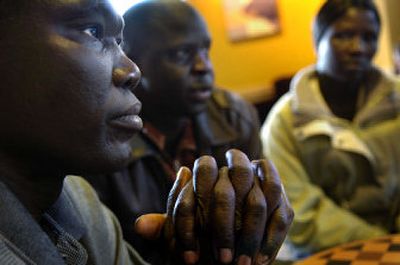Bringing hope

Nearly 18 years after fleeing repression in Ethiopia, Agwa Taka is bringing back to his native land something he found in Spokane – hope.
Taka is leaving Sunday with suitcases full of toys and a plan to furnish and staff a small orphanage he and his friend, fellow Ethiopian refugee Akway Omot built in Gambella, Ethiopia, this past summer. Accompanying Taka will be Omot’s wife, Achol Aballa and Andrew Lewis, a Spokane man who ran a tent city in Mississippi for U.S. refugees displaced by Hurricane Katrina.
Like Taka, who came to the United States in 1989, Omot and Aballa are Anuak tribal people from the Gambella region in southeastern Ethiopia. The three are among about 20 Anuak who have found freedom and friendship in Spokane.
But they can’t enjoy the comfort of their adopted nation while the existence of their tribe is in question.
“We understand now that the reason we came here was to be a voice for our people, to give our hearts to the Anuak,” Taka said.
It will be the third trip to Africa for Taka, who survived a Sudanese refugee camp only to miss an airline connection in Chicago and ended up in Spokane. Taka works for the First Presbyterian Church, which sponsored him and other Anuak refugees.
Through Taka, the story of a persecuted farming people in the lowlands of impoverished east Africa has become a Spokane story, as the community responds to the Anuaks’ plight.
Earlier this year, when Taka asked Lewis to come to Gambella, the 23-year-old former AmeriCorps volunteer and 2004 graduate of Eastern Washington University jumped at the chance.
“I said this is what I want to do with the rest of my life anyway, and these are my friends,” said Lewis. “So how cool is that, to help friends out.”
In fact, his whole family is making the trip, including his parents, Jack and Cheryl Lewis, who have long supported refugee relief efforts in Spokane and abroad.
While Andrew Lewis helps get the orphanage organized, his younger brother, Ben, packing six donated laptop computers, will coordinate information technology in Gambella. His first step will be finding consistent Internet access.
“We don’t want to dump a lot of Western technology on them,” Andrew Lewis said, “but we want to give (the Anuaks) the tools to communicate and get the word out about themselves.”
The two brothers and a friend set up and ran the tent camp in Pass Christian, Miss., from September 2005 to April 2006. Their role in Hurricane Katrina relief efforts were documented in a January story in The Spokesman-Review.
After leaving AmeriCorps, Andrew Lewis went to work for the Pearson Foundation. The philanthropic group is now contributing in fundraising for Anuak relief.
Meanwhile, the Lewises’ sister and brother-in-law, Kristin and Kevin Lehman, will be establishing a small community library in Gambella. Another sister, Beth, a Central Washington University student, hopes to tutor the Anuak.
While Taka and the rest of the Lewis family will stay in Ethiopia only a few weeks, Andrew Lewis plans to stay “as long as it takes” to get things up and running in Gambella.
Though Taka, Aballa and the Lewises are aware of the political turmoil in Ethiopia that has contributed to the dangerous and deteriorating conditions endured by the Anuak people, they said their mission to Gambella is purely humanitarian.
Taka plans to buy furniture for the 20- by 60-foot orphanage he and Omot built in July with $19,000 raised in Spokane through the Anuak Baare Hope Ministry, the nonprofit relief organization he founded under the auspices of Spokane’s First Covenant Church.
The ministry also has received help from the First Presbyterian Church, as well as other civic and religious groups.
Taka also will hire staff to run the orphanage before choosing 20 children to live there from among hundreds of orphans.
Meanwhile, Aballa, with Cheryl Lewis’ help, will assess the condition of the widows of the 2004 ethnic cleansing and provide what aid she can. Despite returning to the scene of violence that has claimed her brothers, cousins and friends, Aballa said she is not afraid.
“We have to give them some hope, to tell them there is somebody thinking about them,” Aballa said, adding that in the patriarchal society women and children do not last long without men.
In February 2005, the Rev. Lawrence Hudson, pastor of First Covenant, accompanied Taka to Pochalla in southwestern Sudan, where 15,000 Ethiopian Anuak live in the nearby Alari refugee camp.
Hudson said Anuak Baare Hope Ministry is trying to raise $20,000 for a second well at the camp.
“Without the support of the community here, we cannot do this job,” Taka said.